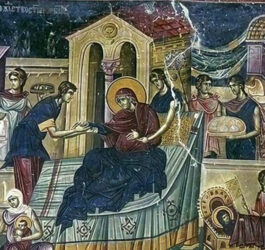 by Chris Banescu –
by Chris Banescu –
In his book, Making Sense Out of Suffering, Peter Kreeft offers us a partial explanation of the mystery of why righteous men are afflicted by seemingly random and unjust suffering and many trials and tribulations in this life. He points us to the Scriptures, specifically the Book of Job, and the lessons we can learn from the suffering of the righteous Job and God’s answer to Job. “Who do you think you are, anyway? By what right do you unquestioningly assume that you can know the answer to this question? Are you in a position to answer it? Where were you when I laid the foundations of the earth?”, the author paraphrases God’s response to the long-suffering Job.
Kreeft explains that for many of us, the suffering we experience in this life will remain a mystery. While sometimes we may grasp the reason “why” we endure afflictions or God allows us a glimpse into the purpose behind our tribulations, most often we cannot know. To truly understand why we suffer would mean to know the mind of an infinite, omniscient, and omnipotent God. And that’s impossible. No man can ever accomplish such a feat. Only Jesus Christ, our Lord and Savior, co-eternal with the Father, Light of Light, True God of True God, can know God’s infinite wisdom and comprehend the reason for His righteous judgment.
Where were you when I laid the foundations of the earth?
In his Epistle to the Romans Saint Paul affirms this truth. “Oh, the depth of the riches both of the wisdom and knowledge of God! How unsearchable are His judgments and His ways past finding out! For who has known the mind of the Lord? Or who has become His counselor? Or who has given a gift to Him that he might be repaid? For of Him and through Him and to Him are all things, to whom be glory forever. Amen” (Romans 11:33-36).
The reason for our suffering is ultimately an unsolvable question, Kreeft cautions us. Man does not even have the right to expect an answer. Like Job’s question, our inquiry presupposes that we’re entitled to ask God why we suffer and that He in turn must provide an explanation. The lesson from Scriptures is that we are wrong on both accounts.
The fallen world does not accept this reality. It does not recognize God’s authority. After all, man is supposed to be the “master of his own destiny” and God must explain Himself to us. When not using God’s silence as “evidence” of His “non-existence,” the world denounces the lack of acceptable answers from the Almighty as “proof” of His “uncaring, cruel, and unloving” nature or as deserved “punishment” from an “angry” God. The fallen world has forgotten God’s infinite love for man revealed on a Cross on Golgotha. It disregards or ridicules Christ’s humility, suffering, humiliation, death, and resurrection solely for our sake and our salvation.
My grace is sufficient for you, for My strength is made perfect in weakness.
Christians however, understand that if God is silent regarding our present suffering that’s His business, not ours. He is not our servant, we are His. Even the Apostle Paul never received an answer about the “thorn in his side” despite repeatedly beseeching the Lord. “And lest I should be exalted above measure by the abundance of the revelations, a thorn in the flesh was given to me, a messenger of Satan to buffet me, lest I be exalted above measure. Concerning this thing I pleaded with the Lord three times that it might depart from me. And He said to me, ‘My grace is sufficient for you, for My strength is made perfect in weakness.’ Therefore most gladly I will rather boast in my infirmities, that the power of Christ may rest upon me” (2 Corinthians 12:7-9).
As Christians we are all called to bear our suffering with dignity and patience, even with gratitude, as the Apostles, Saints, and Church Fathers have taught throughout the ages. We must be faithful even when God is silent and we don’t understand why we suffer and experience inexplicable tribulations. This is hard. It requires great effort. But, it’s the tragic reality we’ve all faced since Adam and Eve were expelled from Paradise. This is part of the cross we now bear while journeying in this fallen world and striving to return to our Father’s House.
God is merciful, gracious, slow to anger, abounding in steadfast love and mercy
We must trust God and endure our afflictions, never losing hope and faith in the Lord’s wisdom, goodness, grace, mercy, and immeasurable love for us. “God is merciful, gracious, slow to anger, abounding in steadfast love and mercy,” Fr. Thomas Hopko often said.
When our suffering becomes unbearable and despair engulfs our soul, remember Christ on that Cross on Golgotha and His suffering, humiliation, and sacrifice freely chosen to destroy death, save us, and give us eternal life. That’s how much God loves us and cares for us. No greater act of love exists in the history of the universe. We must never forget that truth.
![]()
Why do the righteous suffer?
by Peter Kreeft
“A good example of this forgetfulness is in the Book of Job. The clear and powerful point, the blindingly obvious lesson of that book, especially at the end, is the one the author puts into the mouth of God when God finally gives Job his answer, the much longed-for answer to Job’s question, which also happens to be our question: Why do the righteous suffer? Why do bad things happen to good people?
God’s answer is a question: Who do you think you are, anyway? By what right do you unquestioningly assume that you can know the answer to this question? Are you in a position to answer it? Where were you when I laid the foundations of the earth? Are you the author of this story that is your life? Are you your own creator and designer? By what right does the character claim to have the author’s point of view?
But we often miss this obvious answer and look for another. We’re more sympathetic to Job’s point of view than to God’s. We think Job’s questions are perfectly good and fair and right questions – they’re the questions of this book too, after all.
But we forget that questions always presuppose answers to other questions. And Job’s question presupposes at least that he can know the answer, that his question is a problem rather than a mystery, a solvable rather than an unsolvable question. His unspoken presupposition is that all questions are solvable, that the idea of any unsolvable question is scandalous and unacceptable.”
_________________________________________________________
Excerpts from the book Making Sense Out of Suffering by Peter Kreeft. Emphasized words and phrases, and organizational edits — broke up larger paragraphs — to optimize readability made by Chris Banescu.
![]()
The LORD Reveals His Omnipotence to Job
Then the Lord answered Job out of the whirlwind, and said:
Who is this who darkens counsel
By words without knowledge?
Now prepare yourself like a man;
I will question you, and you shall answer Me.
Where were you when I laid the foundations of the earth?
Tell Me, if you have understanding.
Who determined its measurements?
Surely you know!
Or who stretched the line upon it?
To what were its foundations fastened?
Or who laid its cornerstone,
When the morning stars sang together,
And all the sons of God shouted for joy?
Or who shut in the sea with doors,
When it burst forth and issued from the womb;
When I made the clouds its garment,
And thick darkness its swaddling band;
When I fixed My limit for it,
And set bars and doors;
When I said,
‘This far you may come, but no farther,
And here your proud waves must stop!’
Have you commanded the morning since your days began,
And caused the dawn to know its place,
That it might take hold of the ends of the earth,
And the wicked be shaken out of it?
It takes on form like clay under a seal,
And stands out like a garment.
From the wicked their light is withheld,
And the upraised arm is broken.
(Job 38:1-15)





Humans are stubborn, hardheaded, difficult to get through to. Reluctant to let go. Of course the objective is always our salvation. Suffering is the tutor and God’s unexplainable desire for our presence throughout eternity with him the reason.Its the way were made ,not something thrown in later due to the first two and their choices. As you say it is better to let it teach you than to waste Spirit on its reasons. Then putting our milk bottles aside we will sit up at the table and thoroughly enjoy the spiritual meat that is tribulation.